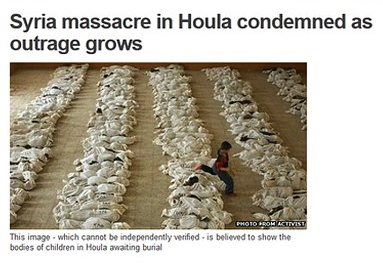The Case Of BBC: The Need For Responsible, Ethical Journalism

The photo, first published over nine years ago, depicts an Iraqi child hopping over rows of dead Iraqi children encapsulated in white sheets of cloth. On May 25, however, BBC presented it instead as an image showing young victims of the Houla massacre, a massacre that is part of the ongoing deadly clashes in Syria.
In an interview with The Telegraph, the photographer, Marco di Lauro, said:
“I went home at 3am and I opened the BBC page which had a front page story about what happened in Syria and I almost fell off from my chair.
“One of my pictures from Iraq was used by the BBC web site as a front page illustration claiming that those were the bodies of yesterday's massacre in Syria and that the picture was sent by an activist.
“Instead the picture was taken by me and it's on my web site, on the feature section regarding a story I did In Iraq during the war called Iraq, the aftermath of Saddam.
“What I am really astonished by is that a news organization like the BBC doesn't check the sources and it's willing to publish any picture sent it by anyone: activist, citizen journalist or whatever. That's all.
“Someone is using someone else's picture for propaganda on purpose."
The editors of BBC released an apology four days after publishing the wrong picture, clarifying that the use of the powerful photo was a “mistake.” They explained that BBC used the photo because the image, which they found circulating on Twitter at the time, was sourced from “activists” in Syria.
This “mistake” is unjustifiable. Twitter is just like any other social media site: if one is to use information or images found there, one needs to make sure the source is credible and the evidence is verifiable. For BBC, a trusted news source, to use a shocking photo of dubious origin and present it as unverified evidence of a massacre in Syria, is unconscionable. The use of the photo may even further an agenda that the corporation itself does not support – immediate intervention in Syria. As di Lauro proposed, the photo may have just been used for propagandistic purposes. Regardless, the fault is with the news agency for failing to verify the source of the photo, not with Twitter.
Whether the use of the image was an extremely naive and careless mistake, or a propagandistic ploy, or neither, it doesn’t matter: using an emotionally charged and shocking photo, accompanying a report on violence in Syria that will have reached millions of people around the world, violates the public’s right to know the truth. The public is deceived and the dignity of the dead is violated.
In a time in which corporations frequently ignore journalistic ethics, and in which the character of a typical journalist has lost its authenticity, each mistake is costly to the profession’s reputation. Journalists are no longer considered genuine public servants; instead, they are accused of acting and writing on the basis of political bias, lobbying for politicians and serving political agendas.
With the power of the media now disseminated to every citizen with a smartphone, new questions about ethics are working their way into the realm of journalism. Especially now, when in Arab countries the doors of democracy are being opened after long and arduous revolutions, the need for accuracy in reporting is vital to prevent political biases or influential corporations from controlling the agenda of the news media, which should only serve the truth.
Objectivity in news reporting is necessary for individuals to know and understand world events. Sensational images, such as the one used by BBC, must be used only when verifiable and when accompanying a thoroughly checked story. The use of powerful photos, no matter if it was “by mistake,” generates inflammatory reactions that may or may not be correlated to the objective truth.
The role of an authentic journalist today is extremely important, since the prejudices displayed by citizen journalists and political activists commanding their own media have only increased. If the largest, most well respected news corporations make such naïve mistakes, thereby indirectly supporting a particular agenda, the truthful reporting inherent to traditional journalism will soon be a memory. When objectivity has left the profession, false reporting will only serve to create more chaos and violence among the peoples of the world.
Reach Contributor Naina Sethi here.



